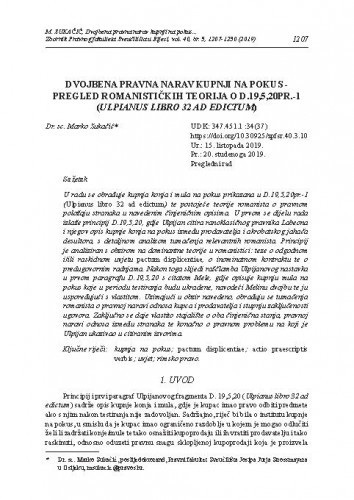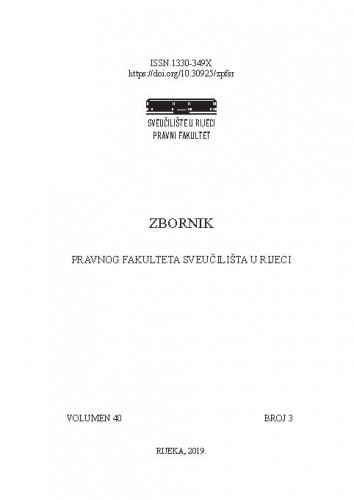(Ulpianus libro 32 ad edictum) te postojeće teorije romanista o pravnom položaju stranaka u navedenim činjeničnim opisima. U prvom se dijelu rada izlaže principij D.19,5,20, gdje Ulpijan citira ranoklasičnog pravnika Labeona i njegov opis kupnje konja na pokus između prodavatelja i akrobatskog jahača desultora, s detaljnom analizom tumačenja relevantnih romanista. Principij je analiziran s obzirom na dominantne teorije u romanistici: teze o odgodnom i/ili raskidnom uvjetu pactum displicentiae, o inominatnom kontraktu te o predugovornim radnjama. Nakon toga slijedi raščlamba Ulpijanovog nastavka u prvom paragrafu D.19,5,20 s citatom Mele, gdje opisuje kupnju mula na pokus koje u periodu testiranja budu ukradene, navodeći Melinu dvojbu te ju uspoređujući s vlastitom. Uzimajući u obzir navedeno, obrađuju se tumačenja romanista o pravnoj naravi odnosa kupca i prodavatelja i stupnju zaključenosti ugovora. Zaključno se daje vlastito stajalište o oba činjenična stanja, pravnoj naravi odnosa između stranaka te konačno o pravnom problemu na koji je Ulpijan ukazivao u citiranim izvorima.; The paper deals with the sale on approval of horses and mules shown in D.19,5,20 pr.- 1 (Ulpianus libro 32 ad edictum) and the existing theories on the legal position of the parties in the source. The first part of the paper sets out principium of D.19,5,20, where Ulpian quotes Labeo, and his description of the sale on approval of horses, concluded between the seller and the acrobatic rider – desultor, with a detailed analysis of the interpretations of relevant romanists. The principium is analyzed with the reference to dominant theories: theses on the suspensive and/or resolutive condition pactum displicentiae, on the innominate contract, and on pre-contractual acts. This is followed by an analysis of Ulpian’s sequel in the first paragraph of D.19,5,20 with a quotation of Mela, where he describes the sale on approval of mules, which are stolen during the test period, with Ulpian’s quote of Mela’s dilemma and of comparison with his own. Next part of the paper contains theories and interpretations of the legal nature of the relationship between the parties and the stage of contract. In conclusion, author presents his own position on the both presented situations, the legal nature of the relationship between the parties, and finally on the legal problem raised by Ulpian in the cited sources.; In diesem Beitrag wird der Probekauf von Pferden und Maultieren, welche in D.19,5,20pr.-1 (Ulpianus libro 32 ad edictum) dargestellt wird, besprochen. Ebenfalls werden romanistische Theorien über die rechtliche Position der Parteien in der genannten Quelle analysiert. Im ersten Teil des Beitrags wird das Principium D.19,5,20 besprochen, wo Ulpian den frühklassizistischen Jurist Labeon und seine Beschreibung des Probekaufs eines Pferds zwischen dem Verkäufer und dem akrobatischen Reiter – desultor zitiert. Diesbezüglich werden die Auslegungen von relevanten Romanisten detailliert analysiert. Das Principium wird unter Bezugnahme vorherrschender Theorien analysiert: Thesen über aufschiebende und / oder auflösende Bedingung pactum displicentiae, über Innominatkontrakte und über vorvertragliche Handlungen. Darauf folgt eine Analyse von Ulpians Fortsetzung im ersten Absatz von D.19,5,20 mit einem Zitat von Mela, in dem er den Verkauf von Maultieren, die während des Testzeitraums gestohlen wurden, beschreibt, und das Dillemma Melas mit seinem eigenen vergleicht. Der nächste Teil des Beitrags enthält Theorien und Interpretationen der rechtlichen Natur der Beziehung zwischen dem Verkäufer und Käufer und der Vertragsstufe. Abschließend erläutert der Autor seine eigene Meinung zu den beiden dargestellten Situationen, der Rechtsnatur der Beziehungen zwischen den Parteien und dem von Ulpian in den zitierten Quellen angesprochenen Rechtsproblem.; Nel lavoro si tratta dell'acquisto a prova di cavalli e mule di cui nel D.19,5,20pr.-1 (Ulpianus libro 32 ad edictum), come anche delle esistenti teorie di diritto romano circa la posizione giuridica delle parti nelle fattispecie descritte. Nella prima parte del contributo si espone il principio D.19,5,20 nel quale Ulpiano cita il giurista del primo periodo classico Labeo e la sua descrizione dell'acquisto a prova del cavallo tra il venditore ed il fantino acrobatico - desultor, con una dettagliata analisi dell'interpretazione degli studiosi romanisti più rilevanti. Il principio è analizzato in base alle predominanti teorie nella romanistica: le tesi sulla condizione sospensiva e/o risolutiva pactum displicentiae, sul contratto innominato e sulle attività precontrattuali. Segue l'analisi della prosecuzione di Ulpiano nel primo paragrafo D.19,5,20 con la citazione di Mela, dove descrive l'acquisto a prova di mule, che nel periodo di prova vennero rubate, riportando il dubbio avanzato da Mela e comparandolo al proprio. Tutto ciò considerato, si disaminano le interpretazioni romaniste circa la natura giuridica del rapporto tra l'acquirente ed il venditore ed il grado di conclusione del contratto. In chiusura si espone il proprio pensiero circa entrambe le fattispecie, la natura giuridica del rapporto tra le parti e finalmente circa la questione giuridica sollevata da Ulpiano nelle fonti citate.
Sažetak

 Zbornik Pravnog fakulteta Sveučilišta u Rijeci : 40,3(2019) / glavni urednik Željko Bartulović.
Zbornik Pravnog fakulteta Sveučilišta u Rijeci : 40,3(2019) / glavni urednik Željko Bartulović.